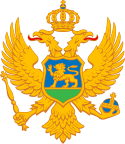Constitution of Montenegro
 |
|---|
| Constitution |
The current Constitution of Montenegro was ratified and adopted by the
Provisions
The Constitution defines Montenegro as a civic, democratic and environmentally friendly country with social justice, established by the sovereign rights of its government.[1][2]
The preamble identifies the nationalities and national minorities of Montenegro as
The Constitution identifies Montenegrin as the official language of the state, replacing Serbian after years of civil conflict. Serbian, Bosnian, Albanian and Croatian are all recognised as official languages. It declares that Cyrillic and Latin scripts have equal standing in law.[1][2]
The Constitution also officially recognises the current flag and coat of arms as legitimate state symbols, as well as the current Montenegrin anthem.[1][2]
The Constitution states that a citizen of Montenegro is not allowed to be made a refugee, nor extradited to another country unless in compliance with a
The Constitution guarantees that religion is separate from the state.[1][2]
The President is constitutionally limited to two five-year terms of office. A candidate must be a citizen of Montenegro and have lived there for at least ten of the prior fifteen years.[2]
Ratification
On 19 October 2007, the Constitutional Parliament of Montenegro held a session filled with heated debate in order to attain the two-thirds supermajority of votes required to ratify the draft Constitution. 55 of the 76 members present voted in favour,[1][3][4] the two-thirds supermajority was therefore achieved, and the Constitution duly ratified. The ruling
Vaselj Siništaj, the sole representative and leader of the
Miodrag Živković, leader of the Liberal Party of Montenegro, announced that the text of the Constitution should be acceptable to all the people of Montenegro.[1][3] Nebojša Medojević, leader of the Movement for Changes, said that no one is completely satisfied with the new Constitution.[9] Medojević said that this will be the Constitution of all citizens of Montenegro, and its approval will help the country gain admittance to the European Union.[3]
Milo Đukanović said to the press that the Constitution will "open the European doors to Montenegro's future".[9]
Kemal Purišić of the Bosniak Party said that the new Constitution will give Bosniaks more rights, and that there will be more democratic institutions in Montenegro for government control.[3]
Controversy
The pro-Serbian parties in Montenegro declared the new Constitution to be
Dobrilo Dedeić, a representative of the Serbian List, ripped up a revised edition of the proposal of the Montenegrin Constitution on 18 October 2007, a day before its adoption, declaring it to be discriminatory toward the Serbian people and stating that it will not bring reconciliation to Montenegro. He also said that the Serbian List, and Serbian people, would not respect the new Constitution. He said they would debate the Serbian issue in Montenegro. He said that the Serbian List would respect the new Constitution as much as the ruling coalition had respected the former Constitution of Montenegro (i.e. the Constitution of the federal Serbia and Montenegro).[10]
Goran Danilović of the Serbian People's Party said he believed that political crises and battles would begin in the country after adoption of the Constitution because it was not designed to achieve political reconciliation. Danilović also announced that he believes the new Constitution to be discriminatory to Serbs in Montenegro.[9]
According to Dragan Šoć of the
The Albanian minority parties consider the new Constitution to be against the interests of the Albanian people. Mehmet Bardhi, leader of the Democratic League in Montenegro, announced that the Montenegrin government has missed the opportunity, through its lack of readiness, to use the new Constitution to fix Montenegrin-Albanian relations in Montenegro.[9]
Previous versions
Union with Serbia
The Constitution of the Republic of Montenegro was approved by
Socialist republic
The Constitution of the republic within
Principality

The Constitution of the
Montenegro thus became a constitutional absolutist monarchy. It defined three branches of authority:
- National Assembly (instead of the Senate long ago abolished by Prince Nicholas)
- the Cabinet of Ministers
- the Great Court.
The National Assembly enacted laws. Prince Nicholas kept the power of adoption, and could also enact laws of significant national importance. The Prince (Књаз) was the hereditary head of state and commander of the army. He also named diplomatic representatives of the state.
The Cabinet of Ministers was named and replaced by the prince, and the government was overseen by the parliament. The constitution guaranteed citizens' freedoms: equality under the law, personal freedoms and freedom of conscience.
Montenegro's flag was a red-light blue-white tricolor and a variation of the princedom's coat of arms, a double-headed eagle, was adopted as state. All three major religions were recognized (Eastern Orthodoxy, Roman Catholicism and Islam), and the Montenegrin Church sanctioned. The capital was Cetinje.
See also
References
- ^ a b c d e f g h i j k l m "Crna Gora otvorila vrata evropske budućnosti" (in Montenegrin). Pobjeda. 2007-10-20.[dead link]
- ^ a b c d e f g "Crna Gora dobila novi Ustav" (in Montenegrin). Antena M. 2007-10-20.
- ^ a b c d e f g h i j "Ustav otvara evropska vrata" (in Montenegrin). Vijesti. 2007-10-20.[dead link]
- ^ a b c d e f "Parlamentarna dvotrećinska većina usvojila najviši pravni akt, a iz opozicije tvrde režim je donio ustav za kartel" (in Serbian). Dan. 2007-10-20. Retrieved 2010-06-12.
- ^ a b "Albanci nijesu ljuti na vlast" (in Montenegrin). Vijesti. 2007-10-21.[dead link]
- ^ "Referendum u Tuzima, sa grba se skidaju krstovi" (in Montenegrin). Vijesti. 2007-10-19.[dead link]
- ^ "Ustav bez podrške Albanske alternative" (in Montenegrin). Antena M. 2007-10-19. Archived from the original on 2011-07-19.
- ^ "Potpisan politički sporazum" (in Montenegrin). Cafe del Montenegro. 2007-10-19.
- ^ a b c d e ">"Različite ocene o novom Ustavu CG" (in Montenegrin). B92. 2007-10-21.
- ^ "Dedeić iscijepao tekst Predloga ustava" (in Serbian). MINA. 2007-10-20.[permanent dead link]
External links
- Constitution of Montenegro
- Constitution of Montenegro hosted by the OSCE Office for Democratic Institutions and Human Rights
- 1992 Constitution of Montenegro at the Wayback Machine (archive index)
